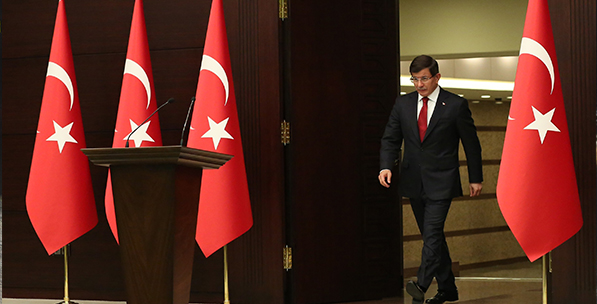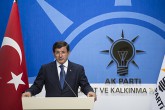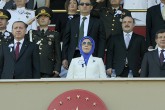Turkey’s colorful political seen never ceases to surprise even the most cautious of observers. It is full of polarizing rhetoric, marginal manifestations of nationalism and identity politics, exaggerated reactions, unrelenting accusations of treason and Byzantine tactics. As we brace ourselves for another round of general elections at the beginning of November, age old vagaries of Turkish politics continue to dominate the public agenda. The dominance of a heightened sense of political uncertainty since June 7 meant that most branches of the bureaucratic apparatus passed into standby mode and both the sensitive domestic security situation in the wake of a series of terrorist attacks and fluctuations in the world economy called for strong leadership.
Despite the protracted process of coalition negotiations, the provisional government under interim Prime Minister Ahmet Davutoğlu rightly conceived the brewing storm and took the brave decision to start comprehensive security operations against urban units of the PKK as well as its outposts in northern Iraq. Concluding the deal with Washington for the use of İncirlik Air Base in operations against the Islamic State of Iraq and al-Sham (ISIS) was also a bold step for a provisional government, along with the decision to join the anti-ISIS coalition with the Turkish Air Force.
Although both the security situation and the warning signals in the economy were calling for a speedy restoration of political stability, the stubborn attitude of the Nationalist Movement Party (MHP) and its chairman, Devlet Bahçeli, to block all coalition options and the chance to take a parliamentary decision for early elections forced the parliamentary system into a corner leading President Recep Tayyip Erdoğan to call for early elections with a neutral caretaker government. Although Erdoğan’s adversaries claimed that taking the country into early elections was Erdoğan’s game plan from the beginning, they have to accept the inability of opposition parties from left to right to form any kind of meaningful political alliance during the election of the Parliament speaker or in coalition negotiations.
Given the short-sighted and not-so-constructive attitude of opposition parties, the decision by Davutoğlu to write invitation letters to selected members of Parliament from different parties to participate in the provisional government as ministers, rather than to the party groups, which were bound to reject the offer straightaway, was a wise one. Indeed, this strategy unveiled the fault lines within the Turkish nationalist MHP with the surprising acceptance from MHP Deputy Party Chairman Tuğrul Türkeş, the son of the legendary founder of the MHP, Alparslan Türkeş, to undertake a ministerial position despite his own party’s strong protests. Türkeş, like his father in various critical junctures in Turkish political history, thought and acted like a statesmen rather than a myopic and pragmatic politician by accepting Davutoğlu’s offer as a constitutional duty to contribute to the governance of the country during a difficult transition. His departure is likely to trigger internal strife within the MHP between the ardent supporters of Bahçeli who ardently follow a negative political line to undermine the Justice and Development Party’s (AK Party) most constructive attempts, and people like Türkeş who prefer to adopt a more patriotic stance when it comes to the maintenance of peace and stability in the country. The latter also perfectly know that the majority of MHP supporters were supporting the formation of a coalition government with the AK Party and the failure to do so might be punished at the ballot box in November.
Türkeş’s brave decision to become a minister, or perhaps a deputy prime minister, in the provisional government has effectively destroyed Bahçeli’s plans to depict the provisional government to be formed as an alliance of the AK Party and the Peoples’ Democratic Party (HDP), which cooperated in the now frozen reconciliati
In this article
- Economy
- Opinion
- Economy
- Elections
- Identity Politics
- Iraq
- Islam
- Islamic
- Kurdistan Workers' Party Terrorist Organization (PKK)
- Middle East
- Northern Iraq
- Opposition
- PKK - YPG - SDF - PYD - YPJ - SDG - HBDH - HPG - KCK - PJAK - TAK - YBŞ
- Prime Minister
- Recep Tayyip Erdoğan
- Terror
- The President of the Republic of Türkiye
- Turkish President
- Türkiye's Justice and Development Party | AK Party (AK Parti)
- Türkiye's Peoples' Democratic Party (HDP)
- Türkiye’s Nationalist Movement Party (MHP)


